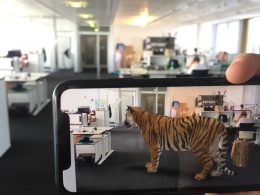Because more and more viewers are using virtual reality, Amazon Prime Video is expanding its content offering to include VR content.
Following Netflix, Hulu and YouTube, Amazon Prime Video is now also offering VR content. Initially, owners of the VR headsets Oculus Quest, Oculus Go and Samsung Gear VR will be able to enjoy it. The first offerings include "The Marvelous Mrs Maisel", "Good Omens", "Guava Island", "Catastrophe", "The Grand Tour", "Fleabag", "The Man in the High Castle", "Carnival Row", "Bosch" and Tom Clancy's "Jack Ryan". According to Amazon, the VR content will be continuously expanded.
The Amazon Prime Video app offers users the opportunity to watch Prime video titles in a virtual theatre environment. It has a voice search function for the entire Prime catalogue. Prime Video VR is only available at launch for Prime subscribers in the USA and the UK.
There has long been talk of Amazon expanding into VR. Back in 2016, job advertisements showed that the company wanted to produce original VR content out of Amazon Studios. The company even commissioned former Tribeca director Genna Terranova to realise the mixed reality content. However, Terranova's Linkedin page indicates that she has since taken on a more general role at Amazon Studios and may focus less on original VR productions.
Amazon is on trend
Amazon is by no means premature with its content offering. According to a recent representative survey of more than 1,200 people aged 16 and over conducted by the digital association Bitkom, virtual reality is becoming increasingly popular. One in three Germans aged 16 and over (32 per cent) has already tried virtual reality glasses. In the previous year, this figure was only 24 per cent. Ten per cent own such glasses. "Virtual reality is approaching the mass market. Numerous manufacturers now offer virtual reality glasses, and there are more and more suitable apps for users," says Bitkom expert Dr Sebastian Klöss.









